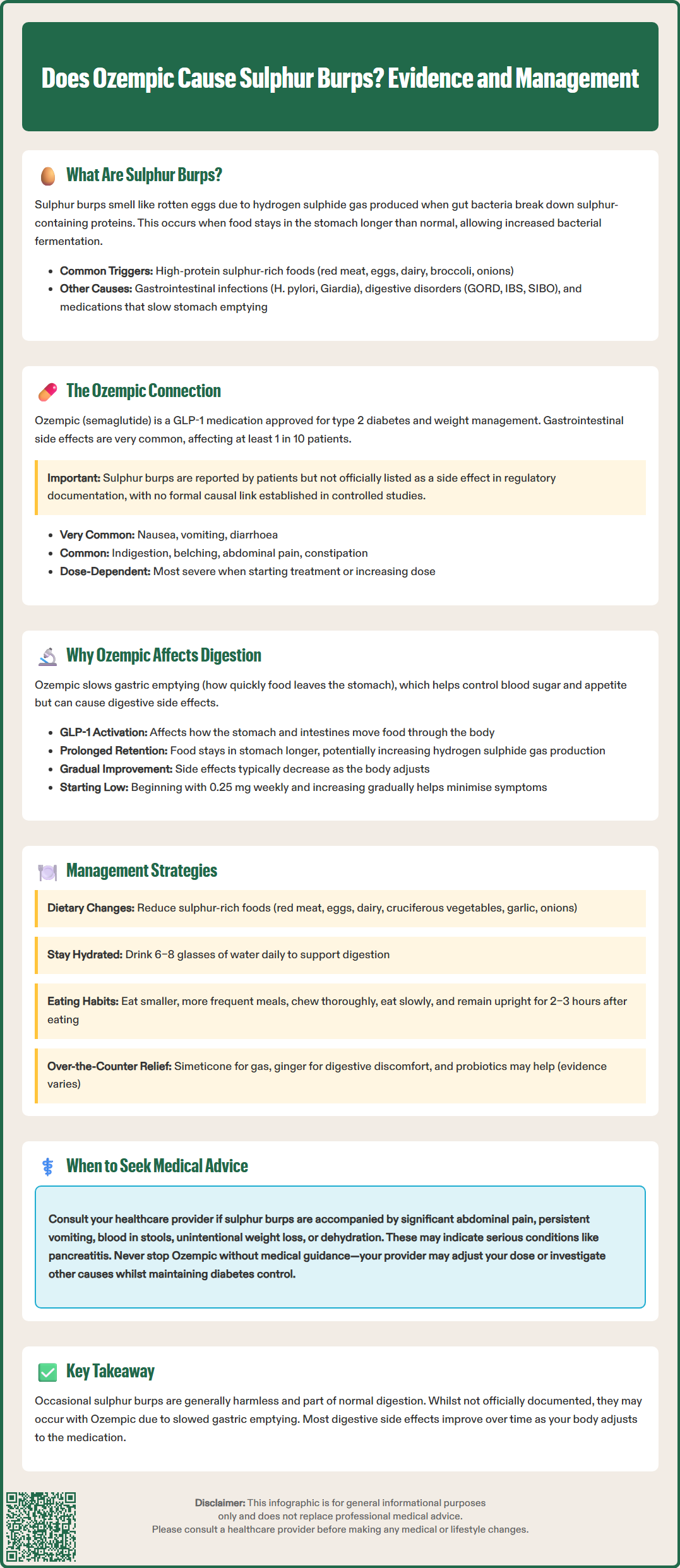
Does Ozempic cause sulphur burps? Many patients taking semaglutide (Ozempic) report experiencing this unpleasant digestive symptom. Sulphur burps—belching with a distinctive rotten egg odour—result from hydrogen sulphide gas in the digestive tract. Whilst not explicitly listed in regulatory documentation, patient reports and clinical observations suggest a potential association between Ozempic and sulphur burps. This article examines the evidence linking semaglutide to this side effect, explains the underlying mechanisms involving delayed gastric emptying, and provides practical management strategies. Understanding why these symptoms occur and how to address them can help patients continue their diabetes treatment more comfortably whilst minimising gastrointestinal disturbances.
Quick Answer: Ozempic may contribute to sulphur burps through its mechanism of delaying gastric emptying, though this specific symptom is not formally listed in regulatory documentation.

Mounjaro® is the most innovative GLP-1 medication proven to dramatically curb appetite, hunger, and cravings to help professional men achieve substantial weight loss.
Start Here
Wegovy® is a weekly injectable GLP-1 medication with proven effectiveness in reducing appetite, hunger, and cravings to help busy professionals lose significant weight.
Start HereSulfur burps (also spelled 'sulphur' in UK English), medically termed eructation with hydrogen sulfide, are characterised by belching that produces a distinctive odour resembling rotten eggs. This unpleasant smell results from hydrogen sulfide gas being expelled from the digestive tract. Whilst occasional burping is a normal physiological process that releases swallowed air, sulfur burps indicate the presence of specific gases produced during digestion.
The primary cause of sulfur burps is the breakdown of sulfur-containing proteins in the gastrointestinal tract. When certain foods rich in sulfur—such as red meat, eggs, dairy products, cruciferous vegetables (broccoli, cauliflower), and alliums (garlic, onions)—are digested, bacteria in the gut, particularly in the colon, metabolise these proteins and produce hydrogen sulfide as a by-product. This gas can then travel upwards and be released through belching, often combined with refluxed intestinal gas.
Several factors can increase the likelihood of experiencing sulfur burps:
Dietary choices: Consuming high-protein, sulfur-rich foods
Gastrointestinal infections: Bacterial overgrowth, particularly Helicobacter pylori or Giardia lamblia
Digestive disorders: Conditions such as gastroesophageal reflux disease (GORD), irritable bowel syndrome (IBS), or small intestinal bacterial overgrowth (SIBO)
Medications: Certain drugs that slow gastric emptying or alter gut motility
Delayed gastric emptying: When food remains in the stomach longer than normal, allowing increased bacterial fermentation
Whilst sulfur burps are generally benign, persistent or severe episodes accompanied by other symptoms such as abdominal pain, diarrhoea, nausea, or vomiting warrant medical evaluation. These may indicate an underlying gastrointestinal condition requiring investigation and management, as outlined in NICE Clinical Knowledge Summaries on dyspepsia management.

Ozempic (semaglutide) is a glucagon-like peptide-1 (GLP-1) receptor agonist licensed in the UK for the treatment of type 2 diabetes mellitus and, at higher doses (marketed as Wegovy), for weight management in adults with obesity or overweight with comorbidities. According to the MHRA/EMC Summary of Product Characteristics (SmPC), gastrointestinal disorders are very common adverse reactions with semaglutide, with nausea, diarrhoea and vomiting occurring in ≥1/10 patients, and dyspepsia (indigestion) and belching listed as common side effects (≥1/100 to <1/10 patients).
Whilst 'sulfur burps' specifically are not explicitly listed in the SmPC, there is patient-reported evidence suggesting a potential association. The term may be encompassed within the broader categories of dyspepsia, belching, and gastrointestinal discomfort that are recognised adverse reactions.
The gastrointestinal side effects of Ozempic are well-documented in clinical trials and post-marketing surveillance. According to the MHRA/EMC SmPC, these include:
Nausea (very common)
Vomiting (very common)
Diarrhoea (very common)
Abdominal pain (common)
Constipation (common)
Dyspepsia/indigestion (common)
Belching/eructation (common)
These effects are typically dose-dependent and most pronounced during treatment initiation or dose escalation. It is important to note that while patient forums and healthcare provider observations have documented sulfur burps as a troublesome side effect experienced by some individuals taking semaglutide, there is no official, direct causal link established in regulatory documentation. The association remains largely observational and patient-reported rather than formally quantified in controlled studies.
If you experience sulfur burps whilst taking Ozempic, several practical strategies may help reduce their frequency and severity. These approaches focus on dietary modification, eating habits, and symptomatic management.
Dietary modifications form the cornerstone of management:
Reduce sulfur-rich foods: Temporarily limit consumption of red meat, eggs, dairy products, cruciferous vegetables, garlic, onions, and protein supplements
Avoid trigger foods: Identify and minimise foods that personally exacerbate symptoms, such as processed foods, carbonated beverages, and artificial sweeteners
Increase fibre gradually: A balanced fibre intake supports healthy gut motility, but introduce it slowly to avoid worsening bloating
Stay well-hydrated: Adequate water intake (approximately 6–8 glasses daily) supports digestion and helps prevent constipation
Eating habits and lifestyle adjustments can significantly impact symptom severity:
Eat smaller, more frequent meals rather than large portions
Chew food thoroughly and eat slowly to reduce air swallowing
Avoid lying down immediately after eating; remain upright for at least 2–3 hours
Limit alcohol consumption, which can irritate the gastrointestinal tract
Consider keeping a food diary to identify specific triggers
Over-the-counter remedies may provide symptomatic relief:
Simeticone (an anti-foaming agent, not an antacid) can help reduce gas and bloating
Ginger may soothe digestive discomfort
Peppermint tea might help some people, but use with caution as it can worsen GORD symptoms by relaxing the lower oesophageal sphincter
Probiotics might support healthy gut flora, though evidence is limited
Alginate-containing preparations or antacids may help if heartburn is also present
When to seek medical advice: Contact your GP or diabetes specialist nurse if sulfur burps are persistent, severe, or accompanied by concerning symptoms such as significant abdominal pain (especially if severe or radiating to the back), persistent vomiting, blood in stools or black stools, unintentional weight loss, or signs of dehydration. These could indicate serious conditions including pancreatitis or gallbladder disease, which require urgent assessment.
If you are also taking insulin or sulfonylureas and experiencing reduced food intake due to digestive symptoms, monitor your blood glucose closely as you may be at risk of hypoglycaemia.
Your healthcare provider may consider dose adjustment, temporary treatment interruption, or investigation for other underlying causes. Never discontinue Ozempic without medical guidance, as this may affect your diabetes control.
If you suspect an adverse reaction to Ozempic, you can report it through the MHRA Yellow Card scheme (yellowcard.mhra.gov.uk or via the Yellow Card app).
Understanding the pharmacological mechanism of Ozempic helps explain why gastrointestinal side effects, including potentially sulfur burps, occur in some patients. Semaglutide exerts its therapeutic effects through multiple pathways that directly influence digestive function.
Mechanism of action: Ozempic is a GLP-1 receptor agonist that mimics the action of naturally occurring glucagon-like peptide-1, an incretin hormone released by the intestine in response to food intake. GLP-1 receptors are widely distributed throughout the body, including the pancreas, brain, and gastrointestinal tract. When activated, these receptors:
Enhance glucose-dependent insulin secretion from pancreatic beta cells
Suppress inappropriate glucagon release
Reduce appetite through central nervous system effects
Significantly slow gastric emptying—the rate at which food leaves the stomach
This delayed gastric emptying is central to both Ozempic's therapeutic benefits and its gastrointestinal side effects, as acknowledged in the MHRA/EMC SmPC. By prolonging the time food remains in the stomach, semaglutide promotes satiety and helps regulate post-prandial glucose excursions. However, this same mechanism creates an environment where:
Food undergoes prolonged exposure to gastric acid and digestive enzymes
Gas production, including potentially hydrogen sulfide, can accumulate
Gastric distension may trigger nausea, bloating, and belching
Additionally, Ozempic affects intestinal motility throughout the gastrointestinal tract. While changes to gut microbiota and altered protein fermentation are theoretically possible with delayed gastric emptying, these mechanisms remain speculative in relation to semaglutide-specific effects.
The gastrointestinal side effects typically improve over time as the body adapts to treatment. The MHRA/EMC SmPC for Ozempic and NICE guidance (NG28) on GLP-1 receptor agonists acknowledge these effects and recommend gradual dose titration to minimise adverse reactions. Starting at a low dose (0.25 mg weekly for Ozempic) and increasing slowly allows the digestive system to adjust to the medication's effects on gastric emptying and motility, potentially reducing the severity of symptoms including sulfur burps.
Whilst sulphur burps are not explicitly listed in the MHRA Summary of Product Characteristics, belching and dyspepsia are recognised common side effects. Patient reports suggest a potential association, though no formal causal link has been established in controlled studies.
Ozempic significantly slows gastric emptying as part of its mechanism of action. This delayed emptying allows food to remain in the stomach longer, potentially increasing gas production including hydrogen sulphide, which causes the characteristic rotten egg odour.
Seek medical advice if sulphur burps are persistent or severe, or if accompanied by significant abdominal pain, persistent vomiting, blood in stools, unintentional weight loss, or signs of dehydration, as these may indicate serious conditions requiring urgent assessment.
All medical content on this blog is created based on reputable, evidence-based sources and reviewed regularly for accuracy and relevance. While we strive to keep content up to date with the latest research and clinical guidelines, it is intended for general informational purposes only.
DisclaimerThis content is not a substitute for professional medical advice, diagnosis, or treatment. Always consult a qualified healthcare professional with any medical questions or concerns. Use of the information is at your own risk, and we are not responsible for any consequences resulting from its use.